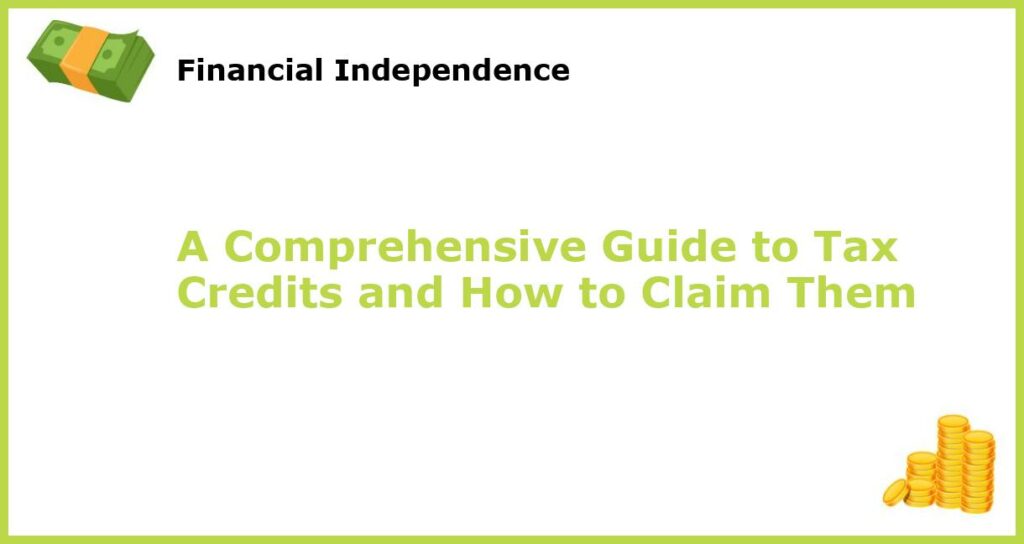Welcome to our comprehensive guide to tax credits and how to claim them. This article will provide you with a detailed understanding of tax credits and the process of claiming them. Understanding how tax credits work can be incredibly helpful, as they are a form of benefit given by the government to people on low incomes.
What are Tax Credits?

Tax credits are a type of benefit given by the government to help individuals and families on low incomes. They are designed to help people make ends meet and pay for the basic necessities of life. Tax credits are different from tax deductions and tax rebates. While tax deductions and rebates reduce the amount of tax you owe, tax credits provide a direct payment to you or reduce the amount of tax you owe.
Who Can Claim Tax Credits?

Anyone can claim tax credits if they are on a low income, whether they are employed or not. The amount of tax credit you can receive will depend on your circumstances, such as your income, whether you have children, and your age. The government sets eligibility criteria that determine whether someone is eligible or not. The criteria may vary depending on the type of tax credit you are eligible for.
Types of Tax Credits

There are two types of tax credits: Working Tax Credit and Child Tax Credit. Working Tax Credit is designed to help people who are in work but on a low income. Child Tax Credit is designed to help families with the cost of bringing up children. There are different eligibility criteria for these tax credits. For instance, to claim Working Tax Credit, you must be working a set number of hours per week, while Child Tax Credit eligibility depends on the number of children and their ages.
How to Claim Tax Credits
Claiming tax credits involves filling out an application form, which you can get from your local Jobcentre Plus office or by calling the Tax Credits helpline. The form requires you to provide personal and financial information that the government will use to determine your eligibility and the amount of tax credits you may receive. You may need to provide evidence of your income, such as payslips, so it’s important to have these documents prepared.
How Much Tax Credit Can You Get?
The amount of tax credit you can get will depend on several factors, such as your income, the number of children you have, and your marital status. For example, if you are a single parent with one child and are earning £15,000 per year, you could receive up to £4,000 in tax credits per year. However, the amount of tax credit you receive may be reduced or stopped altogether if your income increases or your circumstances change.
Changes to Your Circumstances
If your circumstances change, such as you lose your job, have another child, or start earning more money, you will need to notify the Tax Credits office as soon as possible. This will ensure that you are receiving the correct amount of tax credits. If you receive more tax credits than you’re entitled to, you may have to pay back the excess amount.
Repayments of Tax Credits
If you have been overpaid tax credits, you may need to repay the money back to the government. This usually happens when you are paid tax credits that you are not entitled to because of a change in your circumstances that you did not report. Repaying the amount can be done by setting up a repayment plan with the government.
Appealing a Decision
If you disagree with a decision made by the Tax Credits office, you can appeal the decision. To appeal, you will need to provide evidence to support your case. For instance, if the Tax Credits office reduces your tax credit because they believe you are earning more money than you have reported, you can appeal this decision by providing evidence that your income has not increased. If you have any questions about the appeals process, you can speak to an independent advice agency.
Tax Credits and Other Benefits
Claimants of tax credits may also be entitled to other benefits, such as Housing Benefit or Council Tax Reduction. It’s important to check what other benefits you may be eligible for, as this can help increase your overall income and reduce your financial burden.
Claiming Tax Credits Abroad
If you are living abroad for more than eight weeks, you can still claim tax credits, but the amount you receive may be affected. You will need to notify the Tax Credits office of your change in circumstances, as failing to do so may result in overpayment or underpayment of tax credits.







